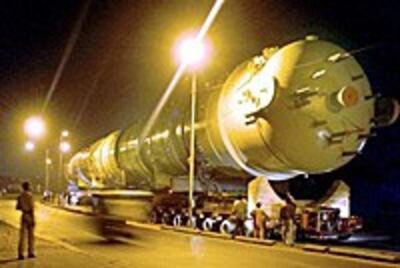
China and India are unlikely to end competitive bidding for energy assets abroad despite a cooperation pact signed in January, analysts say.
Both countries face domestic pressures to compete for foreign oil as their economies surge.
Adam Segal, a senior fellow in Asian studies at the New York-based Council on Foreign Relations, cited an “historical animosity” between China and India, which fought a border war in 1962.
“And then there’s the larger structural problem about two rising powers coming onto the [world] stage at about the same point, making similar demands on energy and resources and the global economy.”
Segal said that to establish trust in energy cooperation, China and India may need to make steady progress over a period of years in settling other economic and security issues.
Even if the pie is getting bigger, people are going to be thinking about, ‘Is India doing better or is China doing better?'
While Chinese officials discuss “win-win” outcomes with no losers, it may be hard to set aside competition for resources that both countries need.
“Even if the pie is getting bigger,” Segal said, “people are going to be thinking about, ‘Is India doing better or is China doing better?’”
Jing Huang, a senior fellow in foreign policy studies at the Washington-based Brookings Institution, agreed.
Competitive countries, evolving policies
“The market is about competition. And no matter which company—whether from India or from China—if they get into the global market of energy supply, they have to compete,” he said.
Cooperation is “kind of idealistic but not realistic,” Huang said.
Oil companies also rarely divulge details of their bidding strategies to others in the market, added Philip Andrews-Speed, head of the University of Dundee’s Center for Energy, Petroleum, and Mineral Law in Edinburgh, Scotland.
Such information could easily be passed on to third parties, damaging a company’s interests, Andrews-Speed said.
“The probability of the chief executive of one company phoning the chief executive of another and saying ‘I’m going to bid up to so many millions. What are you going to do?’ is pretty unlikely.”
Huang, of Brookings, said energy policies of both China and India are in disarray, reducing even more the chances for cooperation.
China’s energy policy “is a mess both in terms of structure and the process of policy-making,” Huang said.
“And India is a country that never had an energy policy. So it sounds like a joke for the two biggest developing countries without a substantial energy policy right now trying to make a treaty on energy supplies.”
The “intention to cooperate” may someday act as a brake on overbidding and thus make a difference over the long term, though, he added.
Original reporting by Michael Lelyveld. Edited for the Web by Richard Finney.
